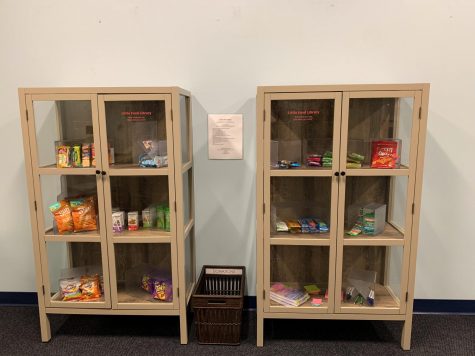The Little Food Library offers free food. Here’s why and how you can check it out.
November 5, 2021

Getting on the train, or eating? Paying a bill, or eating? While these may seem like unfathomable choices for some, they are real life choices that have to be made by those dealing with food insecurity.
Food insecurity affects one in seven residents of Cook County, according to Feeding America’s Map the Meal Gap Study, and it also impacts college students.
“Food insecurity is about the struggle to have enough food to nourish yourself every day,” said Raquel Monroe, co-director of Academic Diversity, Equity and Inclusion.
Monroe, also an associate professor in the Dance Department, teaches “Advanced Topics in Dance,” which discusses Black feminists and choreographic practice. But in this class, Monroe is also covering the topic of food insecurity.
Monroe said people struggling with food insecurity often have to make tough choices, which include being able to buy food or pay rent. They may also have to decide between buying food or having enough money to get on the CTA or purchase school supplies.
“[They are] difficult choice[s] that we don’t want anyone to have to make,” Monroe said. “So many of our students are having to make those kinds of choices.”
The Student Government Association and the Columbia library’s answer to this problem is the Little Food Library. The Little Food Library is comprised of two cabinets on the second floor of the library stocked with non-perishable and single-serve food items such as protein bars, popcorn, pretzels, nuts, fruit juices and more.
The Little Food Library is open to anyone at Columbia. It is not monitored and does not require an application or proof of financial need, and it is accessible during regular library hours.
Michelle Ferguson, project manager for the Little Food Library, has had a passion for helping people impacted by food insecurity since she was a kid.
“[My passion] started when I was a child,” Ferguson said. “My father was a truck driver, and [he] would bring things home, and we would distribute them in our community.”
Ferguson went on to do volunteer work at food pantries, which included providing meals for people in her community.
“You don’t know what is happening to individuals within their home setting,” Ferguson said. “So to be able to bring something literally to someone’s table to assist them in feeding their children or themselves, it makes a world of difference.”
Plans for starting the Little Food Library were in the works in 2019, alongside other projects such as the Little Free Library and the Little Art Library.
But Dennis McGuire, assistant director of the Columbia library, said taking on all three projects was a rather big task. The library team was in a discussion about launching all three, but their discussion was cut short when the campus was mostly shut down due to COVID-19. Because of this, they decided to prioritize the Little Food Library.
“We saw the need for helping students with food insecurity,” McGuire said. “We decided instead of trying to tackle all three at once, [to] focus on the one that had the most urgent need at the time.”
Kim Hale, the college’s academic engagement librarian, is thankful for the Student Government Association’s role in helping the library secure funding for the Little Food Library last semester.
“We hope that we can have more student involvement because it’s for students,” Hale said. “In many meetings [I’ve attended], food insecurity comes up quite a bit.”
The Little Food Library does not supply whole meals. Individuals with additional needs can contact ColumbiaCares, an organization that provides ColumbiaCare Packages. The service provides a week’s supply of food to students experiencing a temporary need.
Students who submit a request through the Student Alert system in MyColumbia are eligible for assistance twice per month during the academic year. Requests can be submitted here.
If you have a question about the Little Food Library, please call the library at 312-369-7900 or email them.







